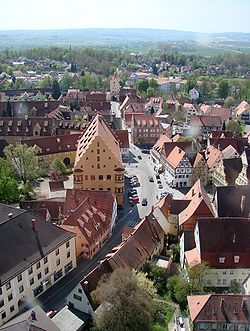Nördlingen
| Nördlingen | |
|---|---|

Nördlingen, south view from the church tower Daniel
|
|
| Coordinates: 48°51′0″N 10°30′0″E / 48.85000°N 10.50000°ECoordinates: 48°51′0″N 10°30′0″E / 48.85000°N 10.50000°E | |
| Country | Germany |
| State | Bavaria |
| Admin. region | Swabia |
| District | Donau-Ries |
| Government | |
| • Lord Mayor | Hermann Faul (PWG) |
| Area | |
| • Total | 68.10 km2 (26.29 sq mi) |
| Elevation | 441 m (1,447 ft) |
| Population (2015-12-31) | |
| • Total | 19,841 |
| • Density | 290/km2 (750/sq mi) |
| Time zone | CET/CEST (UTC+1/+2) |
| Postal codes | 86720 |
| Dialling codes | 09081 |
| Vehicle registration | DON, NÖ |
| Website | www.noerdlingen.de |
Nördlingen is a town in the Donau-Ries district, in Swabia, Bavaria, Germany, with a population of approximately 24,000. It was first mentioned in recorded history in 898, and in 1998 the town celebrated its 1100th anniversary. The town was the location of two battles during the Thirty Years' War, which took place between 1618–1648. Today it is one of only three towns in Germany that still has a completely established city wall, the other two being Rothenburg ob der Tauber and Dinkelsbühl.
Another attraction in the town is the Saint Georg's Church's 90 m steeple, called "Daniel", which is made of a suevite impact breccia that contains shocked quartz. Other notable buildings are the town hall (which dates to the 13th century), St. Salvator church and the Spital, a former medieval hospital. The Ries crater museum is located in the well-preserved medieval tanner's quarter.
The city is home to several other museums, such as the Bavarian Railway Museum, the Nördlingen city museum (Stadtmuseum), the city wall museum (Stadtmauermuseum) and Augenblick museum with panoramas, magic lanterns, silent films, barrel organs, pianolas, music boxes and gramophones.
Nördlingen is also known for the Scharlachrennen, a horse riding tournament that was first mentioned in 1463.
The remains of a Roman castellum, built in the 85AD and probably called Septemiacum, have been found under the city. In 1998, Nördlingen celebrated its 1100-year-old history.
Nördlingen was one of Germany's major trading towns, until its importance declined with the battles of the Thirty Years' War. In 1215 Emperor Frederick II declared Nördlingen a Free Imperial City, and it remained so until 1802 when it changed to become part of present-day Bavaria. The Nördlingen trade fair (Pfingstmesse) was first mentioned in 1219.
...
Wikipedia


